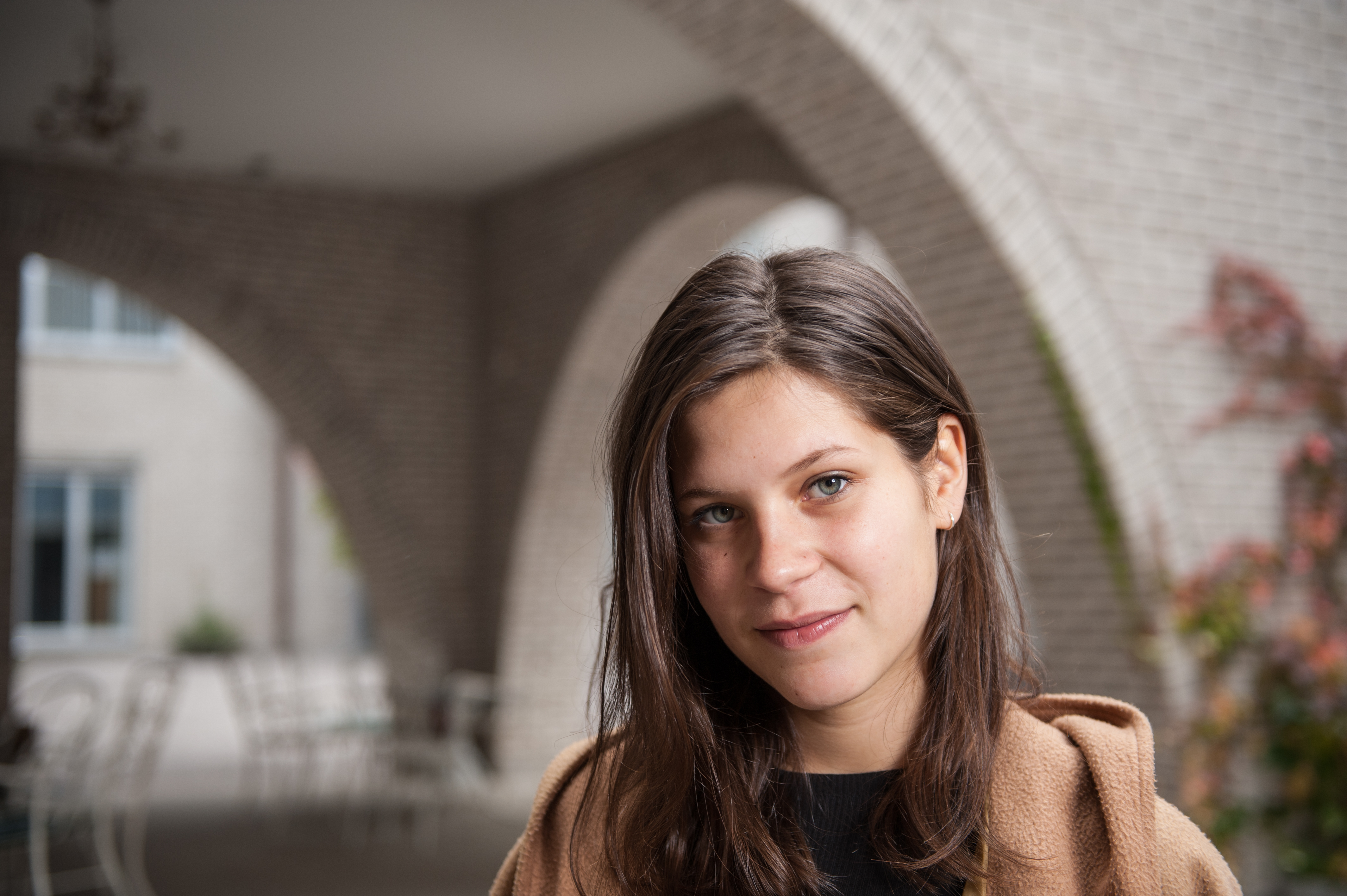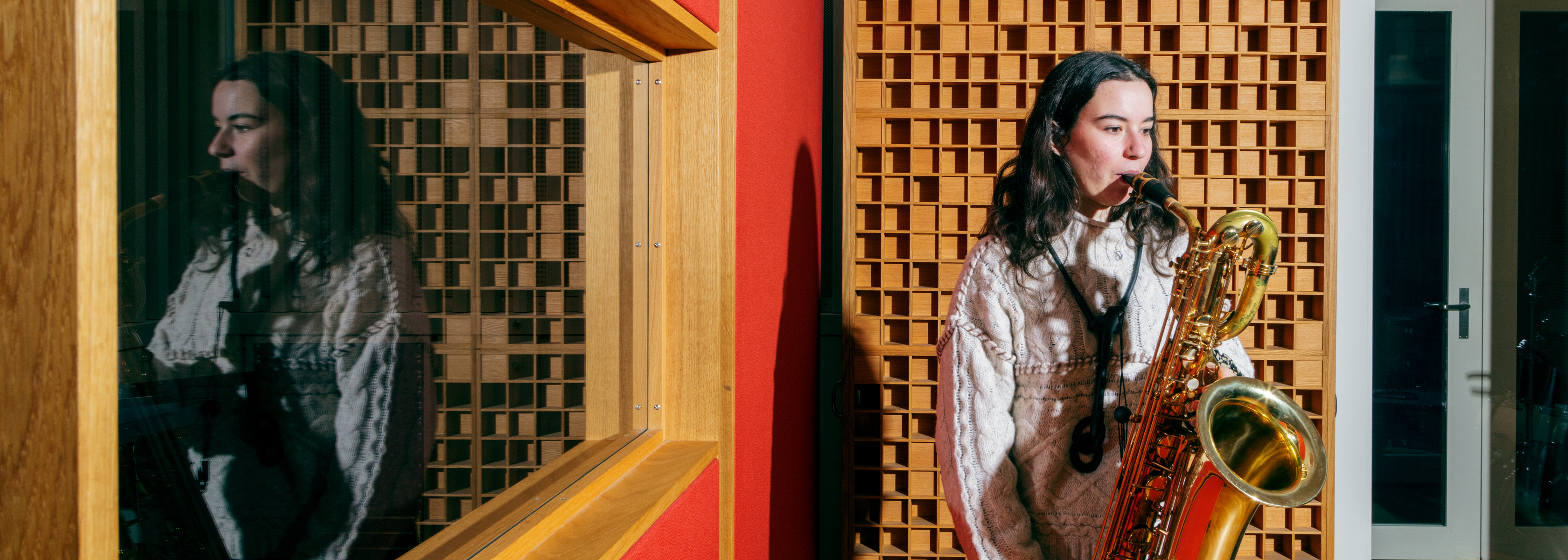BA Jazz: Instrumental/Vocal or Composition
“I used to think, How could jazz musicians pick notes out of thin air? I had no idea of the knowledge it took. It was like magic to me at the time.” Calvin Hill in Paul F. Berliner’s outstanding book Thinking In Jazz – The Infinite Art of Improvisation
Key data
- Degree
- Bachelor of Arts FHNW in Music, Jazz
- Studying type
- Full time
- ECTS points
- 180
- Study start
- Beginning of September
- Duration
- 6 semesters
- Teaching language
- German, English
- Place
- Jazzcampus
- Stay abroad
- No
- Application fee
- 200 CHF
- Semester fee
- 750 CHF (CH) | 1000 CHF (EU/EFTA) | 1250 CHF (Not-EU/Not-EFTA) More Fees
The application for a Bachelor's degree programme beginning in the fall semester is open between December 15 and February 15.
Mobile navi goes here!

Students of Bachelor degree programme receive extensive practical training and acquire the foundations to develop their own unique and well-rounded identity as an artist. This study programme focuses on perfecting students’ instrumental/vocal proficiency while encouraging them to find their creative voice.
Students will hone their improvisation and ensemble-playing skills by working on seminal works from the jazz tradition. Students are also actively encouraged to compose and perform their own works. In addition, the programme comprises a range of compulsory and elective courses designed to equip students with the necessary skills and tools to perform at the highest artistic level.

A stimulating environment that provided me with the space to develop as an artist.
Admission procedure
Guideline for the admission procedureThe admission procedure of the Academy of Music/FHNW for the Bachelor of Arts in Music Jazz with main subject instrument or vocals takes place in several phases:
Preselection: Video-DossierPreselection: Video-DossierAn audiovisual (video/sound) recording of three pieces accompanied by an ensemble must be submitted. As an option, personal compositions by the applicants can be included in the repertoire. The selection of the recorded music should highlight both the interpretative and improvisational skills and show familiarity and affinity with jazz as well as possibly with related musical genres.
Criteria for the creation of the videos
- All excerpts should be recorded in their entirety, in their original state and uncut.
- We recommend using a stereo microphone and placing it in the best possible position. If none is available, the microphone of a camera, computer or smartphone can also be used.
- The video should be shot from a static perspective, hands and face should be clearly visible.
- Public recordings can be used as long as they meet the above criteria and have not been edited.
- The recordings should be recent and in no case older than one year.
- The individual pieces can be recorded separately.
Upload and transmission
- To upload the video, please choose either the Vimeo (https://vimeo.com) or YouTube (https://youtube.com) platform.
- Access to the video must be provided until the end of June of the application year.
- The links to the videos (instrumental/vocal performances) are submitted at the same time as the application by 15 February at the latest.
Preselection Based on the submitted portfolio, a committee decides on the admission to the second round. If the decision is positive, the date of the second round (=live audition) will be announced.
Audition Ensemble and/or solo performance (duration: 30 minutes)
The audition consists of three parts:
- Performance of up to three prepared jazz-oriented pieces of different styles and rhythmic feels (the committee selects)
- Performance of free choice: A personal composition of the applicant / a composition of free choice / a technically demanding etude or transcription or similar. The performance can be unaccompanied or with the accompanying band organized by the university (see below).
- Sheet reading of a simple melody and improvisation over given harmonic sequences and (for guitar, piano or bass majors) accompaniment over a ciphered chord progression or (for percussion majors) interpretation of a submitted lead sheet.
Pieces that have already been submitted for the preselection (video dossier) may also be performed at the audition.
At the audition, the candidate must submit an extensive list of the (jazz) pieces he/she has performed so far and can preferable play by memory (without sheet music).
Ensemble performances can be completed with the candidate's own rhythm section (always the case for online auditions) or with a rhythm section organized by the university. If the performance is with a rhythm section (piano or guitar, bass, drums) organized by the university, the repertoire must be selected in such a way that it can be accompanied without prior rehearsal based on the sheet music provided by the candidate.
Audition mode The second round (live performance=audition) takes places in presence on site. Upon request, the audition can take place in an online mode. The request has to be made upon the application. Once granted, the choice is binding. Without a specific request, the audition will be scheduled to take place on site.
Specific requirements for the online audition:
- If possible, the online audition should be completed with an independently organized ensemble (at least in duo). If possible, the online audition should be completed with an independently organized ensemble (at least in duo).
- Care must be taken to ensure the best possible conditions for good transmission quality of the stream, for which we use the ZOOM platform. We recommend registering on http://zoom.us beforehand and familiarizing yourself with the platform.
Analytical examination (theory) Candidates who are invited to the second round will also be invited to the theory examination before the audition. This part of the examination takes place exclusively in live-online mode.
Basics of Harmony:
- Recognizing intervals
- Recognizing major, minor, and so-called church modes
- Harmonizing a melody
- Analyzing of a chord progression
- Analyzing and ciphering three- and four-part chords
- Listening to and analyzing cadences and typical harmonic progressions
EarTraining:
- Listening to and identifying intervals
- Listening to and identifying tetrada (tonal and free)
- Singing a melody at sight
- Melodic dictation
- Singing and naming church scales (so-called modes of the major scale)
Rhythm:
- Singing / clapping binary and ternary exercises from the page, in 4/4 and 3/4 time up to 16th notes, 8th note triplets and quarter notes
- Rhythm dictation at the same level of difficulty
Guideline for the admission procedure The admission procedure of the Academy of Music/FHNW for the Bachelor of Arts in Music Jazz with main subject composition place in several phases:
Preselection: Video-DossierPreselection: Video-Dossier An audiovisual (video/sound) recording of three pieces accompanied by an ensemble must be submitted. One of the pieces should be a personal composition of the applicant. The selection of the recorded music should highlight both the interpretative and improvisational skills and show familiarity and affinity with jazz as well as possibly with related musical genres.
Additionally, at least two notated personal compositions of the applicants and a short written description of at least one of these notated compositions have to be submitted along with the audiovisual recording.
Criteria for the creation of the videos
- All excerpts should be recorded in their entirety, in their original state and uncut.
- We recommend using a stereo microphone and placing it in the best possible position. If none is available, the microphone of a camera, computer or smartphone can also be used.
- The video should be shot from a static perspective, hands and face should be clearly visible.
- Public recordings can be used as long as they meet the above criteria and have not been edited.
- The recordings should be recent and in no case older than one year.
- The individual pieces can be recorded separately.
Upload and transmission
- To upload the video, please choose either the Vimeo (https://vimeo.com) or YouTube (https://youtube.com) platform.
- Access to the video must be provided until the end of June of the application year.
- The links to the videos (instrumental/vocal performances) are submitted at the same time as the application by 15 February at the latest.
Preselection Based on the submitted portfolio, a committee decides on the admission to the second round. If the decision is positive, the date of the second round (=live audition) will be announced.
Audition Ensemble and/or solo performance (duration: 30 minutes)
The audition consists of three parts:
- Performance with an ensemble: Two pieces of free choice, one personal composition of the applicant, one composition by a different composer (the committee selects)
- Solo performance of a personal composition of the applicant or a piece of free choice
- Presentation of two notated personal compositions of the applicant with short prepared explanations (optional also including excerpts to listen to)
- Written assignment (60 minutes)
The written assignment will be communicated on the day of the audition.
Pieces that have already been submitted for the preselection (video dossier) may also be performed at the audition.
At the audition, the candidate must submit an extensive list of the (jazz) pieces he/she has performed so far and can preferable play by memory (without sheet music).
Ensemble performances can be completed with the candidate's own rhythm section (always the case for online auditions) or with a rhythm section organized by the university. If the performance is with a rhythm section (piano or guitar, bass, drums) organized by the university, the repertoire must be selected in such a way that it can be accompanied without prior rehearsal based on the sheet music provided by the candidate.
Audition mode The second round (live performance=audition) takes places in presence on site. Upon request, the audition can take place in an online mode. The request has to be made upon the application. Once granted, the choice is binding. Without a specific request, the audition will be scheduled to take place on site.
Specific requirements for the online audition:
- If possible, the online audition should be completed with an independently organized ensemble (at least in duo).If possible, the online audition should be completed with an independently organized ensemble (at least in duo).
- Care must be taken to ensure the best possible conditions for good transmission quality of the stream, for which we use the ZOOM platform. We recommend registering on http://zoom.us beforehand and familiarizing yourself with the platform.
Analytical examination (theory) Candidates who are invited to the second round will also be invited to the theory examination before the audition. This part of the examination takes place exclusively in live-online mode.
Basics of Harmony:
- Recognizing intervals
- Recognizing major, minor, and so-called church modes
- Harmonizing a melody
- Analyzing of a chord progression
- Analyzing and ciphering three- and four-part chords
- Listening to and analyzing cadences and typical harmonic progressions
EarTraining:
- Listening to and identifying intervals
- Listening to and identifying tetrada (tonal and free)
- Singing a melody at sight
- Melodic dictation
- Singing and naming church scales (so-called modes of the major scale)
Rhythm:
- Singing / clapping binary and ternary exercises from the page, in 4/4 and 3/4 time up to 16th notes, 8th note triplets and quarter notes
- Rhythm dictation at the same level of difficulty
Overview
following study programme
No social media links available.
